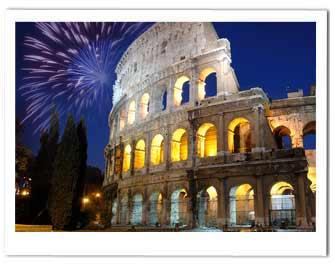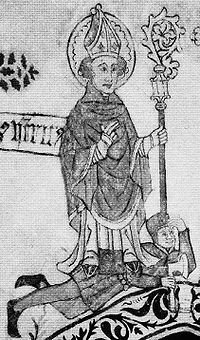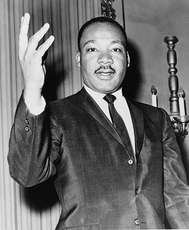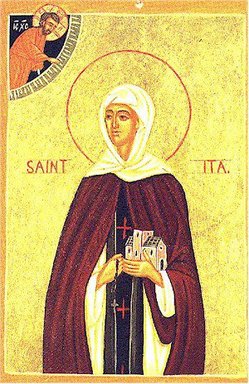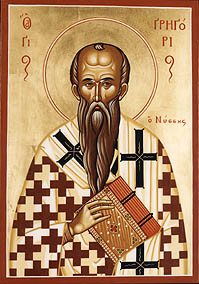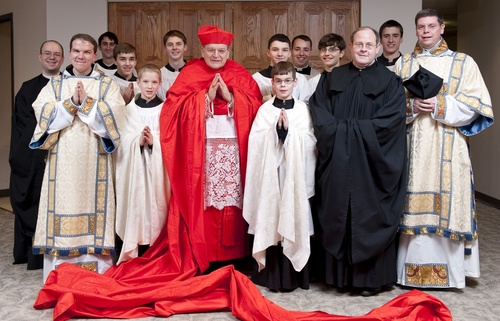January 2011 Archives
 The ongoing reforms for the Legion of Christ to make it more user- friendly continue to be rolled out. The efforts of the Legion's leadership which is overseen and directed by the papal delegate Cardinal Velasio De Paolis, CS, established a more transparent set of procedures by forming a commission to give objective results on legitimate concerns (see this link for detailed contact info) in dealing with Marciel Maciel's sordid past in a honest and charitable manner. The Cardinal also expanded the superior general's council (a set of advisors) from 4 to 6.
The ongoing reforms for the Legion of Christ to make it more user- friendly continue to be rolled out. The efforts of the Legion's leadership which is overseen and directed by the papal delegate Cardinal Velasio De Paolis, CS, established a more transparent set of procedures by forming a commission to give objective results on legitimate concerns (see this link for detailed contact info) in dealing with Marciel Maciel's sordid past in a honest and charitable manner. The Cardinal also expanded the superior general's council (a set of advisors) from 4 to 6.
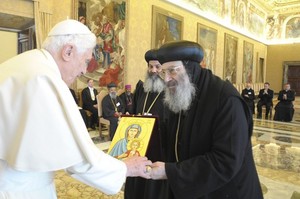 Last week members of the International Commission for Theological Dialogue between the Catholic Church and the Oriental Orthodox Churches, Pope Benedict gave a very brief letter encouraging courage and determination to work with the Holy Spirit in the work of full, visible communion between the churches. He said, "We can only be grateful that after almost fifteen
hundred years of separation we still find agreement about the sacramental
nature of the Church, about apostolic succession in priestly service and about
the impelling need to bear witness to the Gospel of our Lord and Saviour Jesus
Christ in the world." Watch a video clip of the presentation of the icon to His Holiness.
Last week members of the International Commission for Theological Dialogue between the Catholic Church and the Oriental Orthodox Churches, Pope Benedict gave a very brief letter encouraging courage and determination to work with the Holy Spirit in the work of full, visible communion between the churches. He said, "We can only be grateful that after almost fifteen
hundred years of separation we still find agreement about the sacramental
nature of the Church, about apostolic succession in priestly service and about
the impelling need to bear witness to the Gospel of our Lord and Saviour Jesus
Christ in the world." Watch a video clip of the presentation of the icon to His Holiness.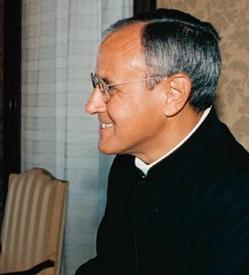 Father Julián Carrón, President of the ecclesial
movement Communion and Liberation indicated the Movement's plans to participate
in the beatification of Pope John Paul II on May 1. Father Carrón's remarks showed gratitude for the Pontiff's
legacy.
Father Julián Carrón, President of the ecclesial
movement Communion and Liberation indicated the Movement's plans to participate
in the beatification of Pope John Paul II on May 1. Father Carrón's remarks showed gratitude for the Pontiff's
legacy.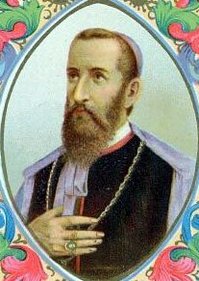 Today the Pontifical Ethiopian College enjoyed time
with Pope Benedict XVI on the occasion to mark the 150th anniversary of the
death of Saint Justin de Jacobis (1800-1860), patron of the College. The
Ethiopian College prepares men for priestly service in their home country. Part
of the Pope's address was devoted to holiness. On holiness the Pope said:
Today the Pontifical Ethiopian College enjoyed time
with Pope Benedict XVI on the occasion to mark the 150th anniversary of the
death of Saint Justin de Jacobis (1800-1860), patron of the College. The
Ethiopian College prepares men for priestly service in their home country. Part
of the Pope's address was devoted to holiness. On holiness the Pope said:"Sanctity lies at the very heart of the ecclesial mystery; it is the vocation to which we are all called. Saints are not some exterior ornamentation of the Church; rather, they are like the flowers of a tree which testify to the endless vitality of the lymph flowing through it. It is good to see the Church like this, in ascension towards the fullness of the 'Vir perfectus'; in continual, demanding, progressive maturation; dynamically driven towards complete fulfilment in Christ."
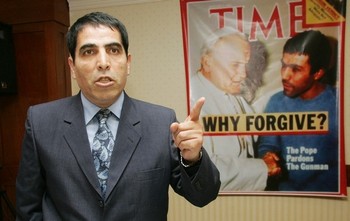
... the man wounded by Satan should not be ashamed to confess his, and leave it behind, and beg for the medicine of penance. For gangrene comes if a man is ashamed to show his wound, and then the whole is harmed. Whoever is not ashamed has his wound healed, and goes back to battle again; but if gangrene comes, he cannot be healed, and he cannot take up his arms again.
The learned will shine like the brilliance of the firmament, and those who train many in the ways of justice will sparkle like the stars for all eternity.
O God, you made Saint Thomas known for his zeal for holiness and his dedication to sacred doctrine. Help us to grow in wisdom by his teaching and in holiness by imitating his faith.
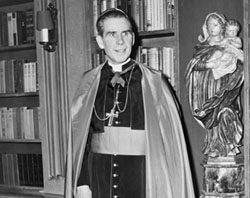 The Bishop of Peoria, Daniel R. Jenky, CSC, has jump-started the canonization process for Fulton J. Sheen. Jenky took a pause in the case when Archbishop Timothy Dolan indicated that he wanted to keep Sheen's body in the crypt at the Cathedral of Saint Patrick and to see the process to completion. Not a good thing, for sure. The halting of the case happened in November, as you recall.
The Bishop of Peoria, Daniel R. Jenky, CSC, has jump-started the canonization process for Fulton J. Sheen. Jenky took a pause in the case when Archbishop Timothy Dolan indicated that he wanted to keep Sheen's body in the crypt at the Cathedral of Saint Patrick and to see the process to completion. Not a good thing, for sure. The halting of the case happened in November, as you recall.
I am reading Verbum Domini with great eagerness. I am talking my reading seriously and trying to ponder what the Pope has given us as a path to Christ and to live as an authentic Christian today. Let's recall the extraordinary address of Pope Benedict XVI on October 6, 2008 where he said:
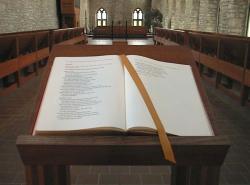
"the Word of God is the foundation of everything, it is the true reality. And to be realistic, we must rely upon this reality. We must change our idea that matter, solid things, things we can touch, are the more solid, the more certain reality. At the end of the Sermon on the Mount the Lord speaks to us about the two possible foundations for building the house of one's life: sand and rock. The one who builds on sand builds only on visible and tangible things, on success, on career, on money. Apparently these are the true realities. But all this one day will pass away. We can see this now with the fall of large banks: this money disappears, it is nothing. And thus all things, which seem to be the true realities we can count on, are only realities of a secondary order. The one who builds his life on these realities, on matter, on success, on appearances, builds upon sand. Only the Word of God is the foundation of all reality, it is as stable as the heavens and more than the heavens, it is reality. Therefore, we must change our concept of realism. The realist is the one who recognizes the Word of God, in this apparently weak reality, as the foundation of all things. Realist is the one who builds his life on this foundation, which is permanent."
Scott W. Hahn, Covenant and Communion (2009), p. 22.
In another place we read:
You cannot put revelation in your pocket like a book you carry around with you. It is a living reality that requires a living person as the locus of its presence.
That is, the believer becomes real insofar as he becomes the Word by hearing such that he does it. That seems to be the only reality that perdures. Revelation is an act in which God shows Himself. Faith is a corresponding act of hearing and doing the Word heard. Outside of that, everything else perishes into nothingness.
J. Ratzinger, God Word: Scripture - Tradtion - Office, Ignatius (2008): 52.
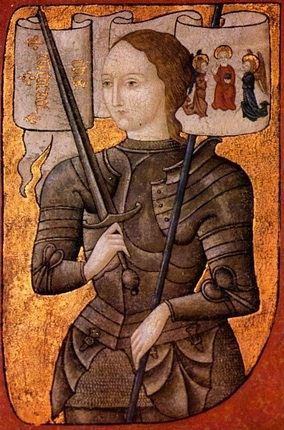
Saint Joan of Arc is a confusing figure for some these days. I think she's abused by the feminists who dash-off with her story for their own agenda which runs contrary to the authentic Christian woman, Joan. If you miss the fact of Joan's rootedness in Christ and the Church, then you miss the point of her life and work. The synthesis of the Pope's teaching is given here. The full texts follows below.
Our catechesis
today deals with Saint Joan of Arc, one of the outstanding women of the later
Middle Ages. Raised in a religious family, Joan enjoyed mystical experiences
from an early age. At a time of crisis in the Church and of war in her native
France, she felt God's call to a life of prayer and virginity, and to personal
engagement in the liberation of her compatriots. At the age of seventeen, Joan
began her mission among the French military forces; she sought to negotiate a
just Christian peace between the English and French, took an active part in the
siege of Orleans and witnessed the coronation of Charles VII at Rheims.
Captured by her enemies the next year, she was tried by an ecclesiastical court
and burnt at the stake as a heretic; she died invoking the name of Jesus. Her
unjust condemnation was overturned twenty-five years later. At the heart of
Saint Joan's spirituality was an unfailing love for Christ and, in Christ, for
the Church and for her neighbour. May the prayers and example of Saint Joan of
Arc inspire many lay men and women to devote themselves to public life in the
service of God's Kingdom, and encourage all of us to live to the fullest our
lofty calling in Christ.
The Pope's homily for Vespers at the Basilica of Saint Paul's Outside the Walls for the feast of the Conversion of Saint Paul and the closing of Week of Prayer for Christian Unity. A video clip of the event.
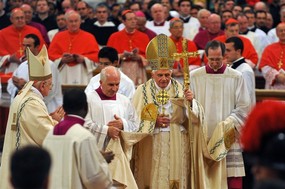
Following the example of Jesus, who on the eve of his Passion prayed to the Father for his disciples "that they may all be one" (John 17:21), Christians continue to invoke incessantly from God the gift of this unity. This request is made more intense during the Week of Prayer, which ends today, when the Churches and ecclesial Communities meditate and pray together for the unity of all Christians.
This year the theme offered for our meditation was proposed by the Christian communities of Jerusalem, to which I would like to express by heartfelt gratitude, accompanied by the assurance of affection and prayer either on my part or on that of the whole of the Church. The Christians of the Holy City invite us to renew and
In the middle of the annual exercise of prayer and study for Christian Unity, the Vatican's daily news paper, L'Osservatore Romano, interviewed Bishop Brian Farrell, LC, secretary of the Pontifical Council for Promoting Christian Unity. The interviewer asked Bishop Farrell about problems in the ecumenical quest with the Orthodox Church, and his answer is below.
We are examining the crucial point of our differences on the Church's structure and way of being and operating: the question of the role of the Bishop of Rome in the Church communion of the first millennium, when the Church in the West and East was still united. After profound studies and discussions, the members of the Theological Commission have come to realize the enormous difference between the lived, assimilated, and narrated historical experience in Western culture and the historical experience perceived in the Eastern vision of things. Every historical event is open to different interpretations. The discussion has not led to a real convergence.
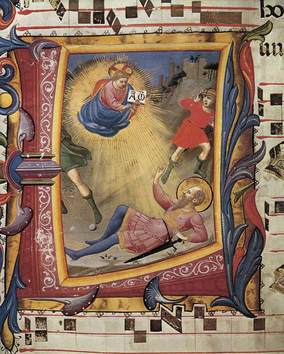 In Paul what is pointed out theologically was also
brought about physically: healed of his inner blindness, he sees clearly. Thus
St Paul was not transformed by a thought but by an event, by the irresistible
presence of the Risen One whom subsequently he would never be able to doubt, so
powerful had been the evidence of the event, of this encounter. It radically
changed Paul's life in a fundamental way; in this sense one can and must speak
of a conversion. This encounter is the centre St Luke's account for which it is
very probable that he used an account that may well have originated in the
community of Damascus.
In Paul what is pointed out theologically was also
brought about physically: healed of his inner blindness, he sees clearly. Thus
St Paul was not transformed by a thought but by an event, by the irresistible
presence of the Risen One whom subsequently he would never be able to doubt, so
powerful had been the evidence of the event, of this encounter. It radically
changed Paul's life in a fundamental way; in this sense one can and must speak
of a conversion. This encounter is the centre St Luke's account for which it is
very probable that he used an account that may well have originated in the
community of Damascus.
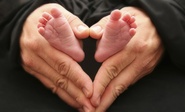
"An estimated 2 billion human beings have died through abortion in the last forty years alone. This is something most people don't realise and it needs to be emphasized," says Joseph Meaney, Director of International Coordination at Human Life International. In addition, Meaney pointed out: "its becoming increasingly clear that the vast majority of Americans are against abortion on demand, and over the years more pro-life justices have been appointed to the Court, but yet the law itself and the court's decision has not changed. The result is a growing frustration among Americans that the will of the people is not being respected."
Today tens of thousands of people will march on Washington DC, to
mark this weekend's anniversary of the 1973 Roe v. Wade Supreme Court decision
that legalized abortion in the United States. Yesterday, Cardinal Daniel N. DiNardo, Archbishop of Galveston-Houston, celebrated Mass for thousands in DC. Since 1973, more than 50 million
babies have been aborted, and 300K women developed breast cancer as a result of
having an abortion.
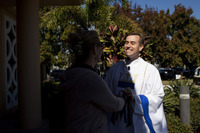 The Florida priest, Father David Toups, is doing what he's been called to do: to be a faithful priest proclaiming the Presence of Christ through preaching the Gospel, praying the Mass, administering the sacraments and being an authentic father of souls. A recent article makes the case.
The Florida priest, Father David Toups, is doing what he's been called to do: to be a faithful priest proclaiming the Presence of Christ through preaching the Gospel, praying the Mass, administering the sacraments and being an authentic father of souls. A recent article makes the case.Here's Pope Benedict's letter for the World Day of Social Communications. There many great things in the document to ponder for our own personal development in the face of Truth, gospel and our brothers and sisters.
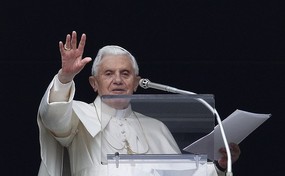
On the occasion of the 45th World Day of Social Communications, I would like to share some reflections that are motivated by a phenomenon characteristic of our age: the emergence of the internet as a network for communication. It is an ever more commonly held opinion that, just as the Industrial Revolution in its day brought about a profound transformation in society by the modifications it introduced into the cycles of production and the lives of workers, so today the radical changes taking place in communications are guiding significant cultural and social developments. The new technologies are not only changing the way we communicate, but communication itself, so much so that it could be said that we are living through a period of vast cultural transformation. This means of spreading information and knowledge is giving birth to a new way of learning and thinking, with unprecedented opportunities for establishing relationships and building fellowship.
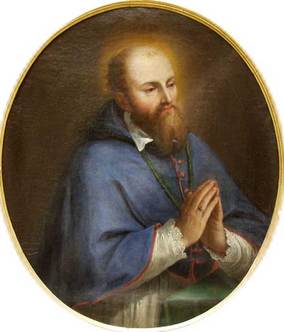
The Church's liturgical memorial for Saint Francis de Sales is a testimony to what can be done with a man of intelligence, humility, zeal for souls and love by God for the salvation of souls. De Sales is known as the modern Thomas à Kempis because of his book, Introduction to the Devout Life. He's also credited in assisting Saint Jane Frances de Chantal in founding the Order of the Visitation in 1610. Francis showed fatherly concern for the poor and refused ecclesiastical honors, e.g., the cardinal's hat, in favor of living as simple a life as possible as a bishop. The Church declared Saint Francis de Sales a Doctor of the Church.
The Church prays at the Liturgy:
O God, who for the salvation of souls willed that the bishop Saint Francis de Sales become all thing to all, grant that, following his example, we may always display the gentleness of Your charity in the service of our neighbor.
From Pius Parsch's The Church's Year of Grace
How Francis developed a gentle and amiable disposition is a story in itself; he was not born a saint. By nature his temperament was choleric, fiery; little was needed to throw him into a state of violent anger. It took years before he mastered his impatience, his unruly temper.
Even after he became bishop, there were slips, as for instance, when someone rang a bell before he had finished preaching. The important point, of course, is that by constant perseverance he did in time attain perfect self-mastery. Wherein lies a lesson.
+++
Today, please remember my Mother, Lynda, at the Altar. She's having her left knee replaced. May Saint Francis de Sales, pray for her and the medical professionals.
 In his letter to the priests of the Archdiocese of New York on the founding of the new Pro-Life Commission, Archbishop Timothy Michael Dolan said,
"These professional men and women, from a variety of backgrounds, fields, and
areas of expertise have generously offered their time and talent to engage in
research, writing, coordination of events, and so much more on behalf of
life. For this I am most grateful, and look forward to working with
them over the years that lie ahead."
In his letter to the priests of the Archdiocese of New York on the founding of the new Pro-Life Commission, Archbishop Timothy Michael Dolan said,
"These professional men and women, from a variety of backgrounds, fields, and
areas of expertise have generously offered their time and talent to engage in
research, writing, coordination of events, and so much more on behalf of
life. For this I am most grateful, and look forward to working with
them over the years that lie ahead."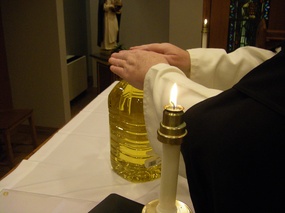
For centuries the Church has blessed olive oil as a sacramental for healing. Some will have oil blessed for lighting a lamp, bodily healing, and even some will use it in cooking. As a sacramental, oil is used in the same way we'd use Holy Water, Holy Salt, and holy images. The blessing given by the priest beseeches God through the intercession of Saint Jude to heal those who use the Oil protecting them from evil and giving the gift of good health of both mind and body. The Bible also speaks of the healing power of oil and its use also reminds us of our own consecration at the time of Baptism and again at Confirmation. This oil is blessed with the relic of St. Jude but is not to be confused with the Sacrament of Anointing of the Sick.
Today, asking for Saint Jude's intercession and using the relic of Saint Jude, Father Ken blessed Saint Jude Oil for the Dominican Shrine of Saint Jude. The Shrine is a ministry of the Church of Catherine of Siena --NYC.
If you would like to get Saint Jude Oil, write to the Shrine at 411 East 68th Street, New York, NY 10065. A $5.00 donation is requested to cover costs of mailing the Oil.
Blessing of Saint Jude Oil
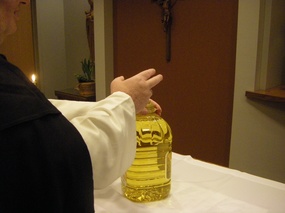
Priest: Our help is in the name of the Lord. All: Who made heaven and earth. God's creature, oil, I cast out the demon from you by God the Father + almighty, who made heaven and earth and sea, and all that they contain. Let the adversary's power, the devil's legions, and all Satan's attacks and machinations be dispelled and driven afar from this creature, oil. Let it bring health in body and mind to all who use it, in the name of God + the Father almighty, and of our Lord Jesus + Christ, His Son, and of the Holy Spirit, the Advocate, as well as in the love of the same Jesus Christ our Lord, who is coming to judge both the living and the dead and the world by fire.
All: Amen.
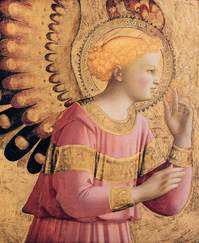 Today marks the
anniversary of Roe v. Wade, the Supreme Court decision that legalized abortion
in the USA. It is possible according to Law to end a pregnancy throughout all
nine months. A prayerful response to this atrocity the Church has proposed to
us to observe January 22 as the Day of Prayer and Penance making
reparation for the sin the abortion, praying that true freedom would be engaged
in respecting all of human life, from conception to natural death, and that the
Law would be changed.
Today marks the
anniversary of Roe v. Wade, the Supreme Court decision that legalized abortion
in the USA. It is possible according to Law to end a pregnancy throughout all
nine months. A prayerful response to this atrocity the Church has proposed to
us to observe January 22 as the Day of Prayer and Penance making
reparation for the sin the abortion, praying that true freedom would be engaged
in respecting all of human life, from conception to natural death, and that the
Law would be changed.
The rubric for prayer for the day:
In all the dioceses of the United States of America, January 22 (or January 23, when January 22 falls on a Sunday) shall be observed as a particular day of penance for violations to the dignity of the human person committed through acts of abortion, and of prayer for the full restoration of the legal guarantee of the right to life. The Mass "For Peace and Justice" (no. 22 of the "Masses for Various Needs") should be celebrated with violet vestments as an appropriate liturgical observance for this day. (General Instruction of the Roman Missal, no. 373)
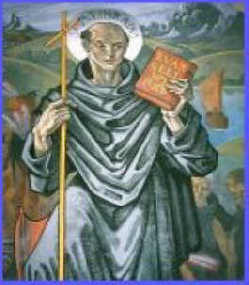 O God, You made glorious in the martyrdom of the hermit Meinrad. Through his intercession, help me to grow in my love for you and in the devotion of the Blessed Virgin Mary. May I follow his example in the Christ-like hospitality and in single-hearted prayer.
O God, You made glorious in the martyrdom of the hermit Meinrad. Through his intercession, help me to grow in my love for you and in the devotion of the Blessed Virgin Mary. May I follow his example in the Christ-like hospitality and in single-hearted prayer.Pope Benedict XVI appointed Attilio Cardinal Nicora, as president of the newly created Financial Information Authority (FIA). Until now, the cardinal has been the head of the Administration of the Patrimony of the Holy See. Also appointed on Wednesday were the members of the executive council of the FIA:
- Claudio Bianchi, former professor of accounting at Rome's La Sapienza University;
- Marcello Condemi, associate professor of economic law at Rome's G. Marconi University;
- Giuseppe Dalla Torre del Tempio di Sanguinetto, rector of Rome's LUMSA University;
- Cesare Testa, former president of the Central Institute for the Sustenance of the Clergy.
Surprisingly, no North Americans were appointed.
The Financial Information Authority was formed on December
30 as an "autonomous and independent body with the specific task of
preventing and countering the laundering of money and the financing of
terrorism with respect to each subject, both legal and physical, entity and
institution of whatever nature, of Vatican City State, of the Dicasteries of
the Roman Curia and of all the other institutions and entities dependent on the
Holy See."
Let us keep the feast of blessed Agnes, and recall the kind of suffering she endured: in the full flower of her youth she died, and found life. She chose to love the Author of life alone; in the full flower of her youth she died, and found life. (the responsory) The Church gives us a young woman martyr of the early 4th century. She is thought to be about 12 or 13 (records are sketchy) Agnes was martyred under the Emperor Diocletian. 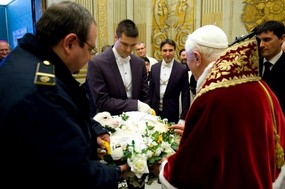 More often than not our remembrance of Agnes focuses less on her virginity and martyrdom --the supreme gesture of witness to the Lord-- and more on the fact that wool is given to the Pope. Sad but true. Agnes' witness to a life of virginity, possessing without possession, of a complete love for God. On this feast a tradition reaching back centuries lambs are raised by the Trappist monks of Tre Fountane in Rome bring to the Pope the wool that will be made into the pallia by the Benedictine nuns of the Abbey of Saint Cecelia (in Trastevere). The pallium is a white band of wool with six embroidered black crosses (the Pope's pallium is slightly different with red crosses and wider). The pallium is worn by the metropolitan archbishop for significant ecclesial events, i.e., Masses of Ordination, consecration of churches, altars, bishops, and on certain feast days. Unfortunately, the pallium is worn too often and without proper distinction of festivity and ecclesial communion with the Pope. The Servant of God Pope Paul VI issued a 1978 document, Inter Eximia, limiting the use of the pallium to the pope and metropolitan archbishops. In 1984, John Paul determined the date of the conferral of the pallia. Before given to the new metropolitan archbishops on June 29th, the feast of Saints Peter and Paul, the pallia rest for short time on the tomb of Saint Peter (the Confessio). You will recall that Saint Agnes is one of the seven women commemorated in the Roman Canon (the BVM would be the 8th). |
This week the Christian Churches around the world are observing the Week of Prayer for Christian Unity. Today, the Pope gave his thoughts on the subject:
1. "we have listening to the teaching of the Apostles, or listening to the witness that they give to the mission, life, death and resurrection of the Lord Jesus. It is what Paul simply calls the Gospel". "Even today, the community of believers recognizes in reference to the teaching of the Apostles the law for their faith; every effort to build unity among all Christians therefore passes through the deepening of fidelity to the deposit of faith handed down to us by the apostles."
 The president and CEO of EWTN, Michael Warsaw sees the National Catholic Register is a perfect addition to their teaching apostolate. So they intend to purchase the newspaper from the Legion of Christ. The Legion has owned the 83 year old newspaper for 15 years. Yet another example of their fall from grace. The takeover happens February 1st.
The president and CEO of EWTN, Michael Warsaw sees the National Catholic Register is a perfect addition to their teaching apostolate. So they intend to purchase the newspaper from the Legion of Christ. The Legion has owned the 83 year old newspaper for 15 years. Yet another example of their fall from grace. The takeover happens February 1st. More and more we are seeing research demonstrating that abortion has caused breast cancer. A few months ago I posted an article saying as much. LifeNews.com published an article on January 17th giving the statistic that in 38 years --since the 1973 Supreme Court decision Roe vs Wade-- that "a least 300,000 cases of breast cancer" have been identified. Baruch College Professor Joel Brind published a 1996 paper in which he made the claim that women who had induced abortion had a "30% greater chance of developing breast cancer." Steven Ertelt's article "Abortion Has Caused 300K Breast Cancer Deaths Since Roe" connects the dots.
More and more we are seeing research demonstrating that abortion has caused breast cancer. A few months ago I posted an article saying as much. LifeNews.com published an article on January 17th giving the statistic that in 38 years --since the 1973 Supreme Court decision Roe vs Wade-- that "a least 300,000 cases of breast cancer" have been identified. Baruch College Professor Joel Brind published a 1996 paper in which he made the claim that women who had induced abortion had a "30% greater chance of developing breast cancer." Steven Ertelt's article "Abortion Has Caused 300K Breast Cancer Deaths Since Roe" connects the dots. Archbishop Timothy M. Dolan's letter to Members of the 112th Congress speaks for itself. As he notes, US Catholics are the largest religious body in the USA. 68 million, 22% of the US population. There are 195 archdioceses and dioceses with one apostolic exarchate. Other interesting statistics can be found here.
Dear Member of Congress,
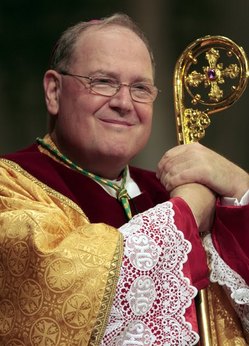
As a new Congress begins, I write to congratulate you and to outline principles and priorities that guide the public policy efforts of the United States Conference of Catholic Bishops (USCCB). As President of the Bishops' Conference, I assure you of our prayers and hopes that this newly elected Congress will advance the common good and defend the life and dignity of all, especially vulnerable and poor persons whose needs are critical in this time of difficult economic and policy choices. We continue to seek ways to work constructively with the Administration and the new Congress and others of good will to pursue policies which respect the dignity of all human life and bring greater justice to our nation and peace to our world.
As bishops, of course we approach public policy not as politicians but as pastors and teachers. Our moral principles have always guided our everyday experience in caring for the hungry and homeless, offering health care and housing, educating children and reaching out to those in need. We lead the largest community of faith in the United States, one that serves every part of our nation and is present in almost every place on earth. From our experience and our tradition, we offer a distinctive, constructive and principled contribution to the national dialogue on how to defend human life and dignity, promote and protect marriage and family life, lift up those who experience economic turmoil and suffering, and promote peace in a world troubled by war and violence.
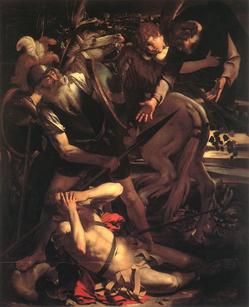 The theme chosen for 2011s Week of Prayer for Christian
Unity is: "One in the apostles' teaching, fellowship, breaking of bread
and prayer" (cf. Acts 2:42). The week of prayer was collaboratively
prepared by members of the Pontifical Council for Promoting Christian Unity and
the Commission on Faith and Order of the World Council of Churches.
The theme chosen for 2011s Week of Prayer for Christian
Unity is: "One in the apostles' teaching, fellowship, breaking of bread
and prayer" (cf. Acts 2:42). The week of prayer was collaboratively
prepared by members of the Pontifical Council for Promoting Christian Unity and
the Commission on Faith and Order of the World Council of Churches.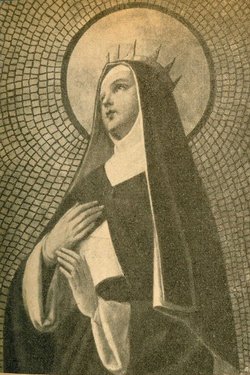
Saint Margaret of Hungary's "... friends and acquaintances petitioned for her to be acclaimed a saint almost immediately after her death. Among them was her own servant, Agnes, who rightly observed that this daughter of a monarch showed far more humility than any of the monastery's maids. Although their testimony expressed Margaret's overpowering desire to allow nothing to stand between her and God, the process of canonization was not complete until 1943. The island where her convent stood, called first the "Blessed Virgin's Isle," was called "Isle of Margaret" after the saint."
(Attwater, Benedictines, Bentley,
Coulson, Dorcy, Farmer)
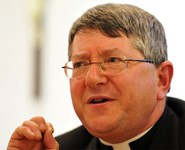 Saturday, January 15th not only saw the ordination of three former Anglican bishops as Roman Catholic Priests, but also one of them, Father Keith Newton, was appointed by the Holy See as the first Ordinary of the Personal Ordinariate of Our Lady of Walsingham.
Saturday, January 15th not only saw the ordination of three former Anglican bishops as Roman Catholic Priests, but also one of them, Father Keith Newton, was appointed by the Holy See as the first Ordinary of the Personal Ordinariate of Our Lady of Walsingham.Decree of
erection of the Personal Ordinariate of Our Lady of Walsingham
The supreme law of the Church is the salvation of souls. As such, throughout its history, the Church has always found the pastoral and juridical means to care for the good of the faithful.
With the Apostolic Constitution Anglicanorum coetibus, promulgated on 4 November 2009, the Holy Father, Pope Benedict XVI, provided for the establishment of Personal ordinariates through which Anglican faithful may enter, even in a corporate manner, into full communion with the Catholic Church. On the same date, the Congregation for the Doctrine of the Faith published Complementary Norms relating to such Ordinariates.
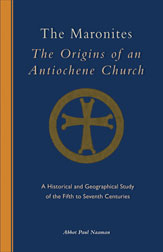
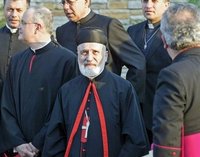 Patriarch Nasrallah Peter Sfeir, 90, the 76th head of the Maronite Church is said to have submitted a resignation a few months ago to His Holiness, Pope Benedict XVI. The Daily Star has stated this move of Sfeir's, but the paper has several facts wrong, so the reliability of specifics is questionable.
Patriarch Nasrallah Peter Sfeir, 90, the 76th head of the Maronite Church is said to have submitted a resignation a few months ago to His Holiness, Pope Benedict XVI. The Daily Star has stated this move of Sfeir's, but the paper has several facts wrong, so the reliability of specifics is questionable.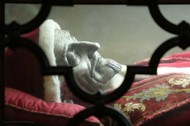 Workers at Saint Peter's Basilica have begun their work to move the body of the soon to be beatified Pope John Paul II from the grottoes to the main basilica. He'll be moved to the Chapel of Saint Sebastian where currently Blessed Pope Innocent XI (seen left) is resting (he was beatified by Pope Pius XII on 7 Oct 1956). I guess we're tired of the silver faced Innocent of the 17th century in favor of John Paul II, Pontiff.
Workers at Saint Peter's Basilica have begun their work to move the body of the soon to be beatified Pope John Paul II from the grottoes to the main basilica. He'll be moved to the Chapel of Saint Sebastian where currently Blessed Pope Innocent XI (seen left) is resting (he was beatified by Pope Pius XII on 7 Oct 1956). I guess we're tired of the silver faced Innocent of the 17th century in favor of John Paul II, Pontiff.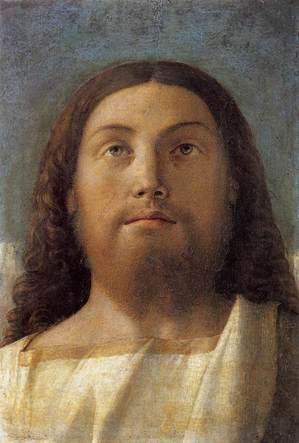
In the days since Christmastide mysteries of faith many theological matters come to mind in knowing Jesus. All of the spiritual masters tell us that it's crucially important for us to come to personally know Jesus Christ, our Lord, in his true light. The image of Christ as a light is reinforced in the baptismal rites where we talk about the sacrament bringing us into inexpressible light. It is also recalled in the Creed. Our enlightenment into the mystery of Jesus' divinity continually needs our reflection, especially when the gospels of the Transfiguration and the Resurrection are proclaimed. As Jesus is transfigured and resurrected, so us: are Children of the Light. We know that Jesus really lives in the light of the Trinity. There, the ultimate grace given by God the Father is having Jesus revealed to us in his true Light. The recognition (awareness) of this grace can only be given to those who are willing to ask for it: "ask and it will be given to you," the Lord says.
The Maronite Church proclaims the joy Christmas and the belief in Christ as Light of the Cosmos at the Sedro for the Sundays of Epiphany:
You have clothed us with your baptism: the robe of glory and the seal of the holy Spirit. You have called us to be spiritual children through our second birth in baptism.
May the Light of Christ, the Risen Lord, continue to be the Light of our lives every day; May it never leave any corners of darkness in us untouched; May the forgiveness and healing his Light brings fully transform us; That we too, the children of the Church, may truly become the Light of Christ for the world, as we pray before the altar at the end of our Eucharistic Celebration.
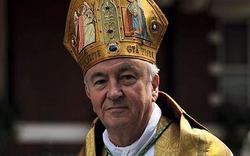
Many ordinations have taken place in this Cathedral during the 100 years of its history. But none quite like this. Today is a unique occasion marking a new step in the life and history of the Catholic Church. This morning the establishment of the first Personal Ordinariate under the provision of the Apostolic Constitution 'Anglicanorum Coetibus' has been announced in our hearing. So I too salute John Broadhurst, Andrew Burnham and Keith Newton who are to be the first priests of the Ordinariate of Our Lady of Walsingham. In particular I offer my prayers and best wishes to Keith, chosen by the Holy Father to be its first Ordinary.
My Dear Brothers and Sisters in Christ,
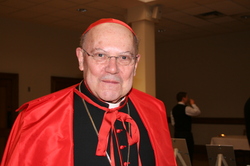
The Ordination to the Priesthood of our three friends, Andrew Burnham, John Broadhurst and Keith Newton, is an occasion of great joy both for them and for the wider Church. I had very much wished to be present with you in Westminster Cathedral today in order to demonstrate my own personal support for them as they make this important step. Unfortunately, however, a long standing commitment of the Congregation for the Doctrine of the Faith to meet with the Bishops and theologians of India in Bangalore has meant that I am unable to be in London today. I am very happy, therefore, to have the opportunity of sending this message and am grateful to Archbishop Nichols for agreeing to represent me and for his willingness to deliver my best wishes.
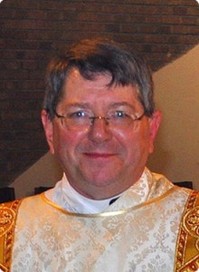
I am humbled to have been appointed by the Holy Father, Pope Benedict XVI, as the first Ordinary for the Personal Ordinariate to be erected in Great Britain under the provisions set out in the Apostolic Constitution Anglicanorum Coetibus. This is not an honour I have sought or expected but I pray that God will give me the wisdom and grace to live up to the trust the Holy Father has placed in me.
My wife and family have been a great support to me throughout my ministry and I know they will continue to do so. I am delighted that Gill was received with me into the full communion of the Catholic Church at Westminster Cathedral on 1 January 2011.
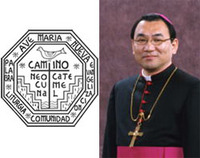 Problems with the Neocatechumenal Way? There seems to be problems with the NeoCats with some of the bishops in Japan to the point that mediator is being appointed. You will recall that the Holy See asked the NeoCats to conform their liturgical ceremonies --Mass included-- to what the Church teaches and expects. They did an odd ceremonial for Mass and claimed some sort of historical precedence. In a church with 2000 years of history, there's precedent for everything. Plus, they've been accused of setting parallel church structures in the parishes where they have a following. I have to say, I think the Church ought to listen to the Japanese bishops. Some of the problems with the NeoCats sound similar to those with the Regnum Christi when talk like "cult like" sensibilities. Also, with lots in the high placed churchmen supporting the work and life of the NeoCats it will difficult to unravel some facts from fiction. This was also true of the Legionaries of Christ.
Problems with the Neocatechumenal Way? There seems to be problems with the NeoCats with some of the bishops in Japan to the point that mediator is being appointed. You will recall that the Holy See asked the NeoCats to conform their liturgical ceremonies --Mass included-- to what the Church teaches and expects. They did an odd ceremonial for Mass and claimed some sort of historical precedence. In a church with 2000 years of history, there's precedent for everything. Plus, they've been accused of setting parallel church structures in the parishes where they have a following. I have to say, I think the Church ought to listen to the Japanese bishops. Some of the problems with the NeoCats sound similar to those with the Regnum Christi when talk like "cult like" sensibilities. Also, with lots in the high placed churchmen supporting the work and life of the NeoCats it will difficult to unravel some facts from fiction. This was also true of the Legionaries of Christ.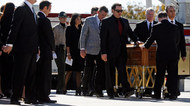 A beautiful of gesture of charity and hope was given to us as a witness of gospel virtue by the monks of a Trappist monastery in Iowa this week when they gave the Green family the casket in which to bury 9 year old Christina, a victim of the shootings last week. The CNN story is here.
A beautiful of gesture of charity and hope was given to us as a witness of gospel virtue by the monks of a Trappist monastery in Iowa this week when they gave the Green family the casket in which to bury 9 year old Christina, a victim of the shootings last week. The CNN story is here.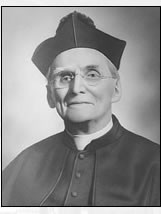
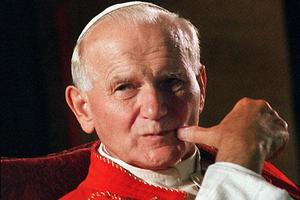
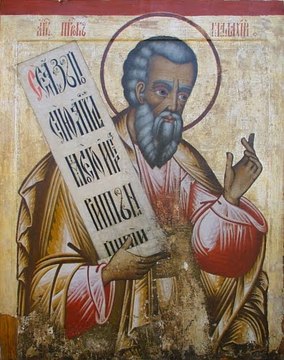
Commemoratio sancti Malachiae, prophetae, qui, post transmigrationem Babylone diem magnum Domini eiusque adventum in templum nuntiavit semperque et ubique mundam oblationem nomini eius offerendam. (Roman Martyrology)
The commemoration of
Saint Malachi, the prophet, who, after the Babylonian Exile, announced the
great Day of the Lord, his coming into the Temple, and that an immaculate
offering be made to His Name, always and everywhere.
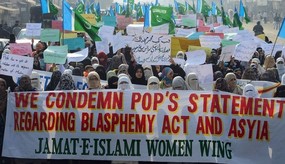 Pakistani Muslims protested the part of Pope Benedict's State of the World address where he says the blasphemy law ought to be repealed. Well, Pakistan's Muslims don't think it's wise.
Pakistani Muslims protested the part of Pope Benedict's State of the World address where he says the blasphemy law ought to be repealed. Well, Pakistan's Muslims don't think it's wise.The online magazine Catholic Culture (here below) carried this story today, which ran yesterday in the AFP, about a Muslim policeman killing Christian women when tensions are already running following the killing of Christians in a church. More sadness for humanity. It is also incredibly sad that the Egyptian Ambassador to the Holy See has stated that the view that Christians are not persecuted. Can you believe it??? The Ambassador's head is in the sand.
Less than two weeks after a church bombing in Alexandria left 21 Coptic Christians dead, an off-duty policeman shot four Christians on a train, killing a 71-year-old man. A fifth person was also wounded.
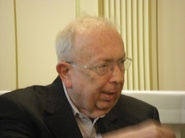 Monsignor Lorenzo Albacete, the ecclesial assistant for Communion and Liberation in the USA, published in the Italy-based online magazine, Il Sussidiario, an appreciative article on this coming weekend's New York Encounter, a faith and culture festival.
Monsignor Lorenzo Albacete, the ecclesial assistant for Communion and Liberation in the USA, published in the Italy-based online magazine, Il Sussidiario, an appreciative article on this coming weekend's New York Encounter, a faith and culture festival.The Pope always seems to get criticized at every twist-and-turn. He announced a gathering in Assisi to have a World Day of Prayer in part to commemorate the 25th anniversary of the first Day of Prayer hosted by John Paul II and to build bridges -he is the Pontiff, the "bridge builder"--after all. Benedict's noble and good motive is this: "I will make a pilgrimage to the town of St Francis, inviting my Christian brethren of different confessions, leaders of the world's religious traditions and, in their hearts, all men and women of good will, to join me on this journey in order to commemorate that important historical gesture of my predecessor, and solemnly to renew the commitment of believers of all religions to live their religious faith as a service to the cause of peace."
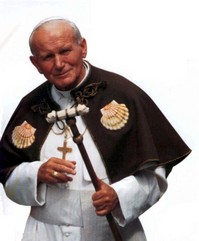 Another door to Pope John Paul's beatification happened yesterday in Rome. The cardinals and bishops who are members of the Congregation of Saints have affirmed the veracity of the medical investigations of a miracle of attributed to the Venerable Servant of God Pope John Paul II, and the theological report on the same. Andrea Tornielli writes about the news.
Another door to Pope John Paul's beatification happened yesterday in Rome. The cardinals and bishops who are members of the Congregation of Saints have affirmed the veracity of the medical investigations of a miracle of attributed to the Venerable Servant of God Pope John Paul II, and the theological report on the same. Andrea Tornielli writes about the news.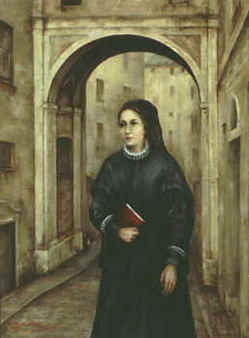
"Since I began to love, love has never forsaken me. It has ever grown to its own fullness within my innermost heart."
Our catechesis today deals with Saint Catherine of
Genoa, a fifteenth-century saint best known for her vision of purgatory.
Married at an early age, some ten years later Catherine had a powerful
experience of conversion; Jesus, carrying his cross, appeared to her, revealing
both her own sinfulness and God's immense love. A woman of great humility, she
combined constant prayer and mystical union with a life of charitable service
to those in need, above all in her work as the director of the largest hospital
in Genoa. Catherine's writings on purgatory contain no specific revelations,
but convey her understanding of purgatory as an interior fire purifying the
soul in preparation for full communion with God. Conscious of God's infinite
love and justice, the soul is pained by its inadequate response, even as the
divine love purifies it from the remnants of sin. To describe this purifying
power of God's love, Catherine uses the image of a golden chain which draws the
soul to abandon itself to the divine will. By her life and teaching, Saint
Catherine of Genoa reminds us of the importance of prayer for the faithful
departed, and invites us to devote ourselves more fully to prayer and to works
of practical charity.
summary of Wednesday Catechesis on Saint Catherine of Genoa
Vatican City State, 12 January 2011
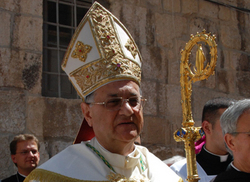 The address of January 11th delivered by the Latin
Patriarch of Jerusalem, His Beatitude, Fouad Twal at the Greek Orthodox Patriarchate to bishops from around the world wasn't that new and substantive but he talked about the tragic spilling of blood of many Christians in recent months, then he made a plea for a common and more deeper communion in the Lord with the hope of sharing the Eucharistic Table on earth. For
several years there's been annual meeting of bishops from the various ecclesial
communions called the Coordination of Episcopal Conferences in Support of the
Church of the Holy Land and another, the Assembly of Catholic Bishops in the
Holy Land. Basically, these bishops are meeting this week to discuss their philanthropic work in Jerusalem. Some of the address is excerpted here:
The address of January 11th delivered by the Latin
Patriarch of Jerusalem, His Beatitude, Fouad Twal at the Greek Orthodox Patriarchate to bishops from around the world wasn't that new and substantive but he talked about the tragic spilling of blood of many Christians in recent months, then he made a plea for a common and more deeper communion in the Lord with the hope of sharing the Eucharistic Table on earth. For
several years there's been annual meeting of bishops from the various ecclesial
communions called the Coordination of Episcopal Conferences in Support of the
Church of the Holy Land and another, the Assembly of Catholic Bishops in the
Holy Land. Basically, these bishops are meeting this week to discuss their philanthropic work in Jerusalem. Some of the address is excerpted here: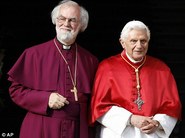 The Roman See is moving ahead with welcoming Anglicans who want to swim the Tiber. People are talking of an announcement of a structure around January 15. Recent ceremonies of welcome and communion signal the serious of many who want to be in communion with the Lord but also with the Lord's Church. In coming weeks some are being ordained priests. Benedict's providing space for those who want to be in full communion with the Catholic Church while keeping cherished patrimony alive --but fixing some theological and liturgical infelicities.
The Roman See is moving ahead with welcoming Anglicans who want to swim the Tiber. People are talking of an announcement of a structure around January 15. Recent ceremonies of welcome and communion signal the serious of many who want to be in communion with the Lord but also with the Lord's Church. In coming weeks some are being ordained priests. Benedict's providing space for those who want to be in full communion with the Catholic Church while keeping cherished patrimony alive --but fixing some theological and liturgical infelicities.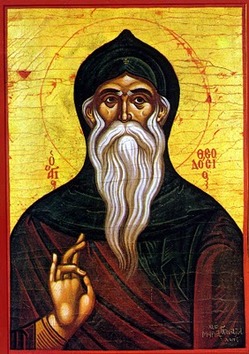 Planted in the courts of your Lord, you blossomed
beautifully with virtue, and increased your children in the desert, showering them
with streams of your tears, O chief shepherd of the divine flock of God. Therefore,
we cry to you: "Rejoice, Father Theodosius." Kondakion - Tone 8
Planted in the courts of your Lord, you blossomed
beautifully with virtue, and increased your children in the desert, showering them
with streams of your tears, O chief shepherd of the divine flock of God. Therefore,
we cry to you: "Rejoice, Father Theodosius." Kondakion - Tone 8We have the state of the school address, the state of the state address, the state of the nation address, and even have the state of the world. Today, Pope Benedict XVI delivered his 'state of the world' speech to the diplomatic corps accredited to the Holy See. Depending on how you count, there are between 178 to 181 diplomats at the Holy See. Please note the Pontiff's concentration on religious freedom; he is, head and shoulders above all world leaders, the voice for religious freedom as the path to true, lasting peace. The Pope's address, the original was delivered in French:
Your Excellencies, Ladies and Gentlemen,
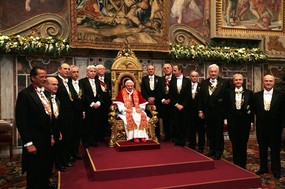
I am pleased to welcome you, the distinguished representatives of so many countries, to this meeting which each year assembles you around the Successor of Peter. It is a deeply significant meeting, since it is a sign and illustration of the place of the Church and of the Holy See in the international community. I offer my greetings and cordial good wishes to each of you, and particularly to those who have come for the first time. I am grateful to you for the commitment and interest with which, in the exercise of your demanding responsibilities, you follow my activities, those of the Roman Curia and thus, in some sense, the life of the Catholic Church throughout the world. Your Dean, Ambassador Alejandro Valladares Lanza, has interpreted your sentiments and I thank him for the good wishes which he has expressed to me in the name of all. Knowing how close-knit your community is, I am certain that today you are also thinking of the Ambassador of the Kingdom of the Netherlands, Baroness van Lynden-Leijten, who several weeks ago returned to the house of the Father. I prayerfully share your sentiments.
Heightened awareness in the days following the violence inflicted on a US Congresswoman and several others and the deaths of a Federal Judge and several others leads to ask what is transpiring in civil discourse. These issues are not merely a US thing but the Australians are also dealing with the same. The Australian Premier Kristina Keneally -a woman similar in style and content as our own Nancy Pelosi, spoke against George Cardinal Pell, the ranking churchman of the Catholic Church in Australia, saying she was saddened by the Cardinal's statements on Catholic faith and belief. So what's been ignited by Premier Keneally is also applicable around the world. Keneally becomes the lens to view the issues.
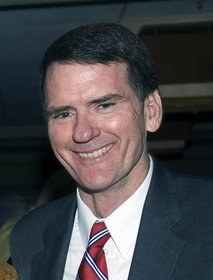 NEW HAVEN, CT--Supreme Knight Carl A. Anderson today
expressed "profound sadness" at the shooting deaths of U.S. District Court
Judge John M. Rolland five others in Tucson on Saturday. He asked the 1.8
million members of the Knights of Columbus and their families to pray for the
recovery of Rep. Gabrielle Giffords and 12 other people who were seriously
injured in the attack, and for the repose of the souls of those who died.
NEW HAVEN, CT--Supreme Knight Carl A. Anderson today
expressed "profound sadness" at the shooting deaths of U.S. District Court
Judge John M. Rolland five others in Tucson on Saturday. He asked the 1.8
million members of the Knights of Columbus and their families to pray for the
recovery of Rep. Gabrielle Giffords and 12 other people who were seriously
injured in the attack, and for the repose of the souls of those who died.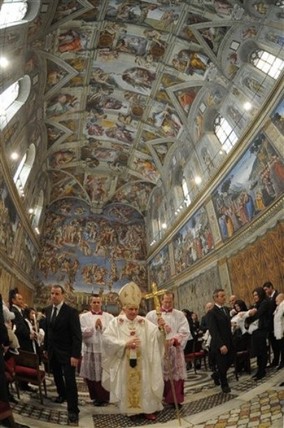
The papal tradition of baptizing infants has been in place for some time. In addition to baptizing converts at the Easter Vigil, Pope John Paul II annually popularized the Rite of Baptism on the feast of the Baptism of the Lord, and since his election 5 years ago, Benedict has continued it. The newly baptized typically are newborn babies. Today, the Sistine Chapel was the magnificent setting for 21 infants ranging between four weeks to four months; all are children of Vatican employees. May God grant the newly baptized the grace of forgiveness of Original Sin, enlightenment, regeneration as a new person in Christ, and adoption as a son or daughter of God. Pope speaks very clearly about today's Scripture for Mass and the theology of the Liturgy we celebrated today. The Pope's homily follows:
It is my pleasure to warmly welcome you this morning, especially you parents and godparents of the 21 infants upon whom, in a few moments time, I will have the joy of administering the Sacrament of Baptism. As has become tradition, this ritual takes place again this year as part of the Holy Eucharist during which we celebrate the Baptism of the Lord. With this the Feast, on the first Sunday after the Epiphany, the Christmas season concludes with the manifestation of the Lord in the Jordan.
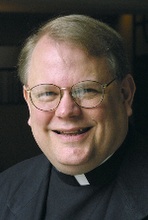 In some corners of the church world the sacred Liturgy is a very neuralgic topic. But it does not need to be painful. There are those who will complain about anything and they doing just that over the forthcoming new translations of the 2002 Roman Missal due to be published on the First Sunday of Advent 2011. The 2002 Missal was published in Latin by Pope John Paul II and it needed to be translated. Today, the Worcester Telegram published a benign and positive with a few good details about the translations.
In some corners of the church world the sacred Liturgy is a very neuralgic topic. But it does not need to be painful. There are those who will complain about anything and they doing just that over the forthcoming new translations of the 2002 Roman Missal due to be published on the First Sunday of Advent 2011. The 2002 Missal was published in Latin by Pope John Paul II and it needed to be translated. Today, the Worcester Telegram published a benign and positive with a few good details about the translations.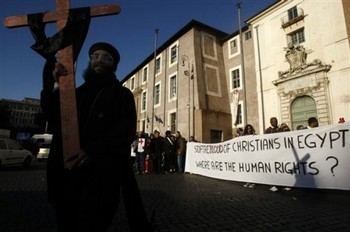
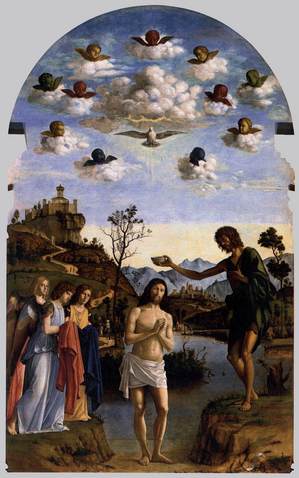 "A voice came from the heavens, saying, "This is my beloved Son, with whom I am well pleased."
"A voice came from the heavens, saying, "This is my beloved Son, with whom I am well pleased."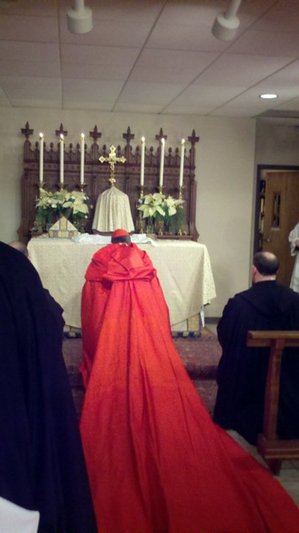
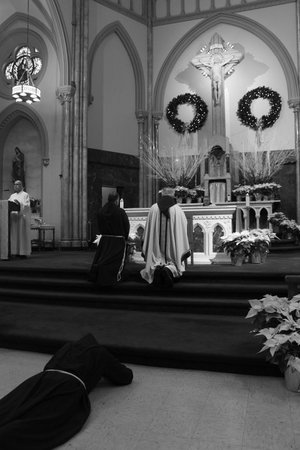 Several men have committed themselves more fully to the Lord and His Church today. A Benedictine monk, a Capuchin friar and Dominican deacons took vows or were ordained.
Several men have committed themselves more fully to the Lord and His Church today. A Benedictine monk, a Capuchin friar and Dominican deacons took vows or were ordained.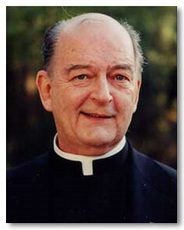
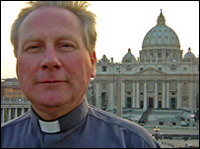
These early days of 2011 are shaping up to be an interfaith challenge with all sorts of messages, clarifications and critiques of current events between Christians and Muslims. The latest, noted here, is a statement given by the Pope's ambassador, the Apostolic Nunccio to Egypt, Archbishop Michael L. Fiztgerald, M. Afr. The Nuncio,73, is a former head of the Pontifical Council for Interreligious Dialogue. The statement was given in response to a request of the Coptic Orthodox Patriarchate clarifying the Pope's January 2nd statement against the attacks against the Coptic faithful.
The statement of His Holiness Pope Benedict XVI with regard to the tragic attack on the Church of the Saints in Alexandria has met with some criticism. It may therefore be helpful to give an account of what the Pope actually said and of his recent teaching on the way to peace.
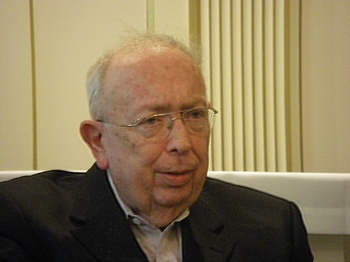
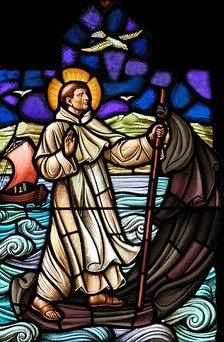
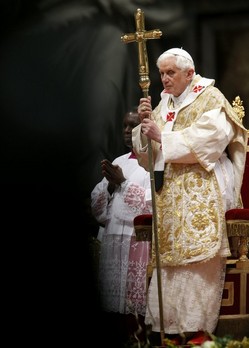 Sadly, the bishops in the USA moved the celebration of Epiphany to a Sunday but in other dioceses, particularly Rome, the traditional Epiphany Mass is celebrated. How much is lost when we monkey around with the sacred Liturgy!!! At Mass today, the Pope preached, given in part:
Sadly, the bishops in the USA moved the celebration of Epiphany to a Sunday but in other dioceses, particularly Rome, the traditional Epiphany Mass is celebrated. How much is lost when we monkey around with the sacred Liturgy!!! At Mass today, the Pope preached, given in part: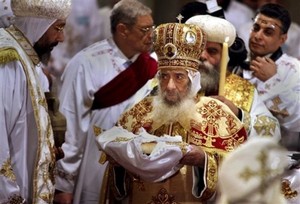 The Coptic Church, along with other non-Chalcedonian churches, are celebrating Christmas today. Besides some Christological differences, the Copts (the Egyptian Orthodox Christians; there are Coptic Catholics, too!) follow the Julian calendar which is a number of days behind the Gregorian calendar. About 10% of the Egyptians are Christian.
The Coptic Church, along with other non-Chalcedonian churches, are celebrating Christmas today. Besides some Christological differences, the Copts (the Egyptian Orthodox Christians; there are Coptic Catholics, too!) follow the Julian calendar which is a number of days behind the Gregorian calendar. About 10% of the Egyptians are Christian.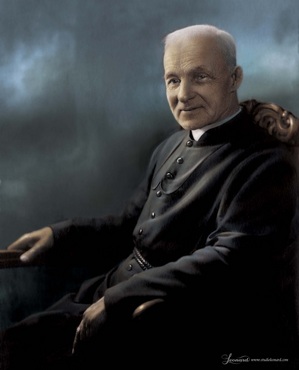
The Revised Grail Psalter is now available
online. This is version of the psalter that will be used in the sacred Liturgy at some point. These are the Psalms that were translated by Abbot Gregory Polan and his brother monks of Conception Abbey. Kudos to Abbot Gregory!
Jesuit Father Federico Lombardi, Director of the Holy See Press Office, responded to what I believe is unfair, even bigoted criticism of Pope Benedict by Imam Ahmed al-Tayeb of Egypt following the January 1st bombing of a Coptic Orthodox church. 21 dead and nearly a 100 wounded. Clear it is to me, the Muslim world rarely pays close attention to what the Catholic Church believes and what the Pope says.
Ahmed al-Tayeb, current current Imam of al-Azhar Mosque, condemned the bombing. The imam paid a visit to the head of the Coptic Orthodox Church, Pope Shenouda III to offer condolences. But his good will toward the Christians however, also include a strident criticism Pope Benedict who asked civil authorities to protect Christians. In Al-Tayeb's mind the Pope's request was an "unacceptable interference in Egypt's affairs." Further, said al-Tayeb, "I disagree with the Pope's view, and I ask why did the Pope not call for the protection of Muslims when they were subjected to killings in Iraq?"
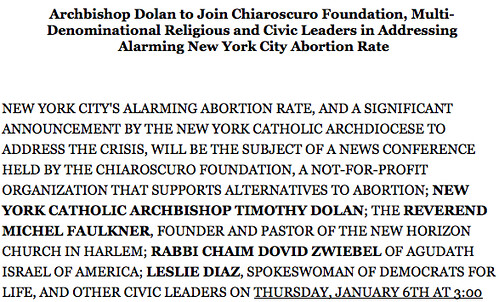
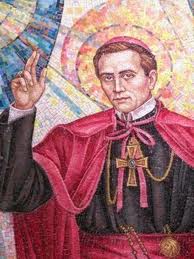 2011 marks the 200th birthday of Saint John Neumann. And the US Redemptorists are making the coming year a notable one to recognize the anniversary. The saint lived March 28, 1811 to January 5, 1860. He was 49 years old at the time of his death and 8 years as the 4th bishop of Philadelphia.
2011 marks the 200th birthday of Saint John Neumann. And the US Redemptorists are making the coming year a notable one to recognize the anniversary. The saint lived March 28, 1811 to January 5, 1860. He was 49 years old at the time of his death and 8 years as the 4th bishop of Philadelphia.Apostolic Letter in the Form of Motu Proprio
Ubicumque et Semper
It is the duty of the Church to proclaim always and everywhere the Gospel of Jesus Christ. He, the first and supreme evangelizer, commanded the Apostles on the day of his Ascension to the Father: "Go therefore and make disciples of all nations, baptizing them in the name of the Father and of the Son and of the Holy Spirit, teaching them to observe all that I have commanded you" (Mt 28:19-20). Faithful to this mandate, the Church--a people chosen by God to declare his wonderful deeds (cf. 1 Peter 2:9)--ever since she received the gift of the Holy Spirit on the day of Pentecost (cf. Acts 2:14), has never tired of making known to the whole world the beauty of the Gospel as she preaches Jesus Christ, true God and true man, the same "yesterday and today and for ever" (Heb 13:8), who, by his death and Resurrection, brought us salvation and fulfilled the promise made of old. Hence the mission of evangelization, a continuation of the work desired by the Lord Jesus, is necessary for the Church: it cannot be overlooked; it is an expression of her very nature.
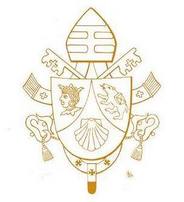
Pope Benedict XVI is building his new team of consultors for the papal agency, the Pontifical Council for the Promotion of the New Evangelization, charged to proclaim the Gospel always and everywhere in a secularized world. This new team really becomes the minds that will build the architecture for the work of the Council. This new Vatican office is slated to be one the most important Vatican offices dealing with building the Kingdom of Heaven. The head of the new council is Archbishop Rino Fisichella.
Today, list has, among others, Archbishop Timothy M. Dolan, Archbishop of New York. He joins the likes of:
The Eminent Lord Cardinals: Christoph Schönborn, OP, Archbishop of Vienna (Austria); Angelo Scola, Patriarch of Venice (Italia); George Pell, Archsbishop of Sydney (Australia); Josip Bozanić, Archbishop of Zagreb (Croatia); Marc Ouellet, PSS, Prefect of the Congregation for Bishops; Francisco Robles
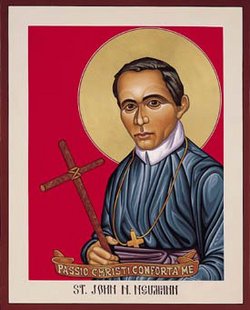 Praise our loving, gracious God
Praise our loving, gracious GodWho has called us each by name
And has chosen shepherds true,
Unimpressed by gain or fame;
These have nurtured all God's fold
Teaching, preaching in our land;
Founding churches, building schools,
Trusting in God's gracious hand;
Learning tongues that all might hear
And to Christ the Lord, God's Son,
And to Spirit, Paraclete:
Ever blessèd Three-in-One!
With John Neumann, crowned with light,
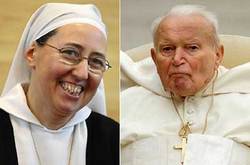 The reports of an approved miracle are surfacing as moving more and more toward a confirmation by the cardinals and bishops of the Congregation for the Causes of Saints before the dossier is given to Pope Benedict for his approval. Theologians, physicians and other professionals have been studying a case of French Sister Marie Simon-Pierre who lived with the effects of Parkinson's Disease until June 2005.
The reports of an approved miracle are surfacing as moving more and more toward a confirmation by the cardinals and bishops of the Congregation for the Causes of Saints before the dossier is given to Pope Benedict for his approval. Theologians, physicians and other professionals have been studying a case of French Sister Marie Simon-Pierre who lived with the effects of Parkinson's Disease until June 2005.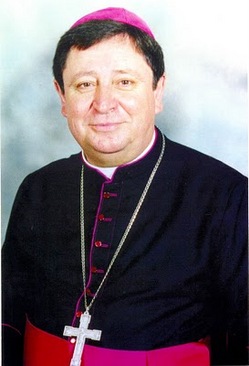 Pope Benedict XVI named today João Bráz de Aviz, 63, Archbishop of Brasilia, as the new Prefect of the Congregation for Institutes of Consecrated Life and Societies of Apostolic Life (AKA Congregation of Relgious), replacing Franc Cardinal Rode, CM.
Pope Benedict XVI named today João Bráz de Aviz, 63, Archbishop of Brasilia, as the new Prefect of the Congregation for Institutes of Consecrated Life and Societies of Apostolic Life (AKA Congregation of Relgious), replacing Franc Cardinal Rode, CM.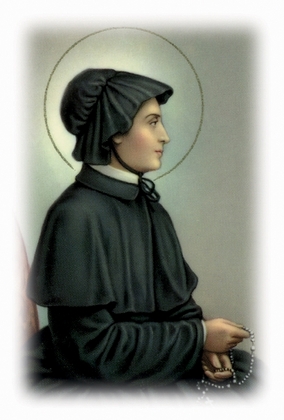
But we lack courage to keep a continual watch over nature, and therefore, year after year, with our thousand graces, multiplied resolutions, and fair promises, we run around in a circle of misery and imperfections. After a long time in the service of God, we come nearly to the point from whence we set out, and perhaps with even less ardor for penance and mortification than when we began our consecration to him.
Saint Elizabeth Ann SetonDivine Office, Office of Readings
There are very few American women who have had an impact on civil and religious society because today's saint, Elizabeth Ann Seton, with the work of education and hospitals and other institutions of culture that her order, the Sisters of Charity, did for all of us.
Ask Saint Elizabeth Ann Seton to intercede for us right now to help us to make Jesus known through acts of charity and mercy.
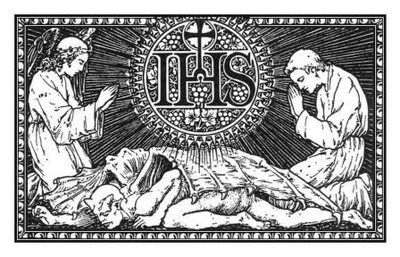
|
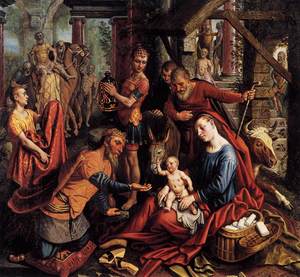
"An offense against God and all humanity," Pope Benedict XVI told those gathered in St Peter's Square for the praying of the Angelus and an address in which he described the New Year's eve bombing of a Coptic Orthodox Church in Alexandria, Egypt. There's been a consistent campaign to terrorize and kill Christians in Arab nations. This was the latest round of Muslim attacks.
The Pope said "Yesterday morning we learned with sorrow the news of the serious attack against the Coptic Christian community in Alexandria, Egypt. This vile act of death, such as planting bombs close to the homes of Christians in Iraq to force them to leave, offends God and all humanity, who only yesterday prayed for peace and began the New Year with hope".
The Holy Father appealed for Christians to recall the Gospel teachings of non-violence: "Before this strategy of violence that has targeted Christians, and has consequences for the whole population, I pray for the victims and family members, and encourage church communities to persevere in faith and witness to non-violence that comes from the Gospel".
"Today we continue to contemplate the divine mystery of Jesus Christ, born in Bethlehem of the Virgin Mary. He is the Word of God made flesh for our salvation, the Wisdom of God who has come to enlighten us. Let us always cherish this presence of Jesus who brings us grace and truth! I wish you all a pleasant Sunday and renew my good wishes for a Happy New Year!"
... as Christians "we remain united in Christ, our hope and our peace!"
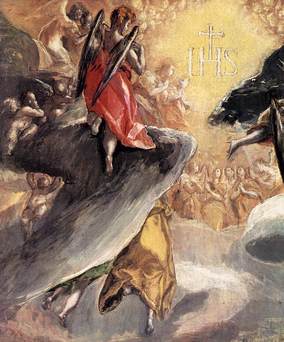
- Jesus, the Second Person of the Blessed Trinity, was made flesh, who fulfilled the Law with the rite of circumcision and accepted the name given by the angel
- Mary, the teenage virgin who stands in wonder and awe before the Spirit
- Joseph, the righteous carpenter, who protected the Gift
- shepherds, the rustic men who were amazed and glorified and praise God.
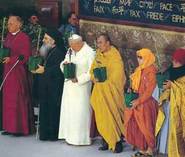 "The year 2011 marks the twenty-fifth anniversary of the World Day
of Prayer for Peace convened in Assisi in 1986 by Pope John Paul II.
On that occasion the leaders of the great world religions testified to the fact
that religion is a factor of union and peace, and not of division and conflict.
The memory of that experience gives reason to hope for a future in which all
believers will see themselves, and will actually be, agents of justice and
peace."
"The year 2011 marks the twenty-fifth anniversary of the World Day
of Prayer for Peace convened in Assisi in 1986 by Pope John Paul II.
On that occasion the leaders of the great world religions testified to the fact
that religion is a factor of union and peace, and not of division and conflict.
The memory of that experience gives reason to hope for a future in which all
believers will see themselves, and will actually be, agents of justice and
peace."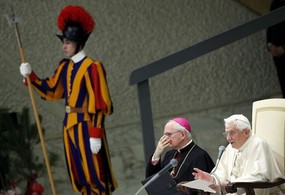
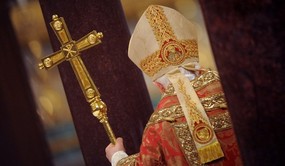 Beginning a new year brings me to reflect more poignantly on the reason for prayer in my life and what it's all about. These words are helpful to me and perhaps to you:
Beginning a new year brings me to reflect more poignantly on the reason for prayer in my life and what it's all about. These words are helpful to me and perhaps to you:
Our praying can and should arise above all from our heart, from our needs, our hopes, our joys, our sufferings, from our shame over sin, and from our gratitude for the good. It can and should be wholly personal prayer. But we also constantly need to make use of those prayers that express in words the encounter with God experienced both by the Church as a whole and by individual members of the Church. For without these aids to prayer, our own praying and our image of God becomes subjective and end up reflecting ourselves more than the living God.Pope Benedict XVIJesus of Nazareth
